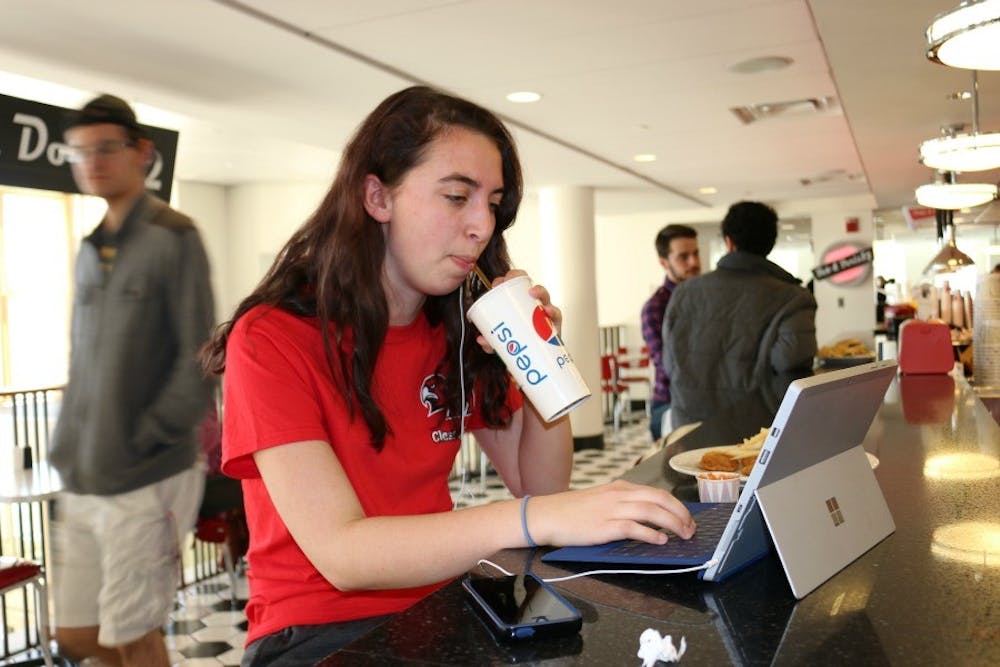By Tess Sohngen, Senior Staff Writer
Every weekday around 12:30 p.m. in the Armstrong Student Center, a sea of students flood the tables and corners for lunch, their eyes focused on laptop screens, smartphones, newspapers and books - anything but their food.
Mindless eating is just one of the many habits of millennials, a generation of multitaskers and technology fiends, but its health consequences have gained much attention from dieticians, health promoters and news outlets.
"People are eating to feed themselves, but not to nourish themselves," said Beth Miller, a food counselor and assistant professor of kinesiology at Miami University. "Eating to feed can lead you down the wrong path as opposed to eating to nourish in mental and physical ways helps set you up for more positive health habits."
The New York Times and the Huffington Post both published stories about the physical and mental consequences of eating while working at the desk. These include decreased productivity, diminished social interaction with coworkers, lack of physical activity and increased caloric intake due to more frequent snacking.
"You're multitasking, which is one of the no-nos when you're trying weight management," Miller said. "Typically, we counsel people to be present with their food, to be attentive and taste the food … those are important pieces psychologically of having that trigger that you feel satisfied."
Sophomore Lindsey Davis said she feels distracted when trying to multitask by eating and working during lunch. Although she does not often mix work and meals, she tends to eat less and snack more when she does.
"If I do, it's because I'm in a hurry," said Davis.
[media-credit name="Photo by Jing Long | Sophomore Stephanie Bachtell" align="aligncenter" width="900"] [/media-credit]
[/media-credit]
The fear of losing study time by taking a break to eat appears to be a common idea among college students at Miami who choose to eat while working.
"We see that as a luxury we don't have, that we can't take the time," said Miller.
Like Davis, sophomore Lindsey Kober said she does not multitask eating and working often. Both agreed that they snack more while concentrating on something else, which leads to eating more calories throughout the day.
Enjoy what you're reading?
Signup for our newsletter
"If I'm working on something, I'll think, 'Hey, I should be snacking on something for doing this," said Kober.
On the other hand, junior Catherine Scherer said she eats and works every day when she comes to King Library, but that doesn't make her snack more throughout the day.
"Usually, instead of working, I'll allot 15 minutes to [eating]," said Scherer.
She added that she feels less productive when she tries to eat and work because she will stop working to go on Facebook or another social media site while she eats.
"It's not 'work,' but the concept is the same," Miller said. "It's like watching TV and snacking on something, but that's not work."
Miller refers to this mindless eating as "eating amnesia," when people become unaware of the amount and quality of food they consume because their focus is elsewhere.
"That's one of the biggest consequences and challenges that can lead to overeating," said Miller, adding that overeating can then lead to weight management and long-term issues. "It can really open the doorway to chronic diseases when you let that process continue."
Miller said students are just as susceptible to eating at the desk as full-time workers. In her classes that straddled the lunch hours, she would see students busily finishing their lunch at the beginning of class. She attributes this to a larger societal shift away from eating patterns that include family meals. Today, more people eat alone than ever before.
"It's a phenomenon that has happened, and I noticed it even as a parent," said Miller. "I love our family meal time … We try to have dinner time as a protected time to have meals together."
She noticed when her college-aged children return home, they appreciate and enjoy cooking and sharing a meal together more so than when they lived at home.
"Maybe it's not family, but you have friends and people and a social meal where you can sit and enjoy the food and enjoy company and conversation," said Miller. "It becomes a purposeful time."




